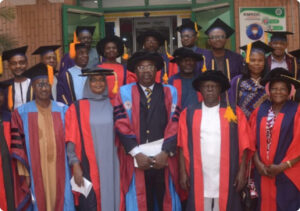BACKGROUND INFORMATION
Nanotechnology is an emerging interdisciplinary field of research involving diverse expertise in Engineering/Building Technology, Life science, Physics, Chemistry, Mathematics, Medicine, Agriculture and information processing. Globally, activities in nanotechnology are growing rapidly, driven by strong interest and investments from commercial and public sectors these have already seen short-term returns in areas ranging from drug delivery, waste and portable water purification, high performance materials for engineering infrastructure, biomedical and alternative energy development which are the key ingredients of sustainable development goals. Despite the recognition of nanotechnology as a tool for sustainable development, its teaching and research are still seriously lagging behind especially in West-African sub-region. It is interesting to note that no University in West African sub region runs postgraduate courses either at diploma or master’s level in nanoscience and nanotechnology.
The Educational programme of the master degree in nanoscience/nanotechnology is to enable the students understand and apply nanoscience and nanotechnology concepts and methods. It will also provide the students with basic knowledge of scientific innovation that combines academic excellence with innovative and entrepreneurial approaches to research. The aim of these courses is to provide opportunities necessary for successful and sustainable exploitation of combined basic nanoscience/nanotechnology with practical development of nanostructured materials and functional nano devices in the field of nanotechnology. The strategic priority area of the proposed program will address the real-world challenges by building knowledge and technology rich economy through sustainable education in nanotechnology. The purpose of sustainable education in nanotechnology is to maintain a world class research and development in realising the full potential of nanotechnology and transformation of these technologies into products for economic growth and development. Therefore, the graduate programme will be designed to educate and train the students with an interdisciplinary curriculum that will focus on core scientific fundamentals and their applications to the thematic real-life problems.
OBJECTIVES OF THE PROGRAMME
The programme is specifically designed to:
i. discuss interesting and emerging nanotechnologies by providing interdisciplinary scientific and engineering knowledge necessary to understand fundamental physical differences at the nanoscale.
ii. gain an appreciation of synthesis, characterization, processing and manufacturing processes of nanocomponents and nanosystems.
iii. address shortage of expertise in the area of nanoscience/nanotechnology and applicable solutions of the benefits of nanotechnology for sustainable development that will support economic growth.
iv. acquire practical nanotechnology knowledge and real-world applications that will help the learners to become more effective in their current role and better equip them as nanotechnologist.
v. acquire skilled and innovative ideas that would transform Africa’s natural resources into goods and services, driven by entrepreneurship and Information and Communication Technology (ICT), to positively affect the economy and thus the quality of life of her people.
ADMISSION REQUIREMENTS
The criteria for admission into M. Tech in Nanoscience and Nanotechnology programme are as follow:
- Candidates applying for M. Tech must have minimum of five ‘O’ level credit passes in NECO/WAEC/NABTEB or its equivalent for international students which must include English, Mathematics and any other (three) relevant science subjects (Chemistry, Biology/Agricultural Science and Physics) at no more than two sittings.
- National Youth Service Corps (NYSC) certificate or NYSC exemption certificate (Nigerians only)
- M.Tech candidates must ensure their Academic Transcripts are received on time to allow for consideration of the application.
- Candidates applying for master’s degree must have at least a second-class lower honour degree or its equivalent for foreign candidate.
- A third class (Hons) degree with at least three years of post-qualification experience in the relevant field may be considered.
- Candidates with recognized PGD with a minimum of lower credit (CGPA of 2.50) in relevant fields with, at least one-year post-qualification experience may be considered.
- Candidates must provide three referees, one of whom must be his/her supervisor or an academic referee.
- A qualifying examination may be necessary.
PROGRAMME DURATION
The full time M. Tech. in Nanoscience and Nanotechnology programme shall run for a minimum of 3 semesters and a maximum of 6 semesters.
GRADUATION REQUIREMENTS
1. Candidates are expected to be successfully acquire a minimum of 48 credit units made up of 28 units of core courses, 12 units of electives, 2 units for internship/industrial work experience and 6 units of thesis.
2. Thesis in the area of specialization is also a requirement and the candidate is required to pass an oral defense of the thesis for graduation.
COURSE STRUCTURE (Taught course with research project)
The M. Tech. in Nanoscience and Nanotechnology programme is run by course work (made up of core and courses), internship/industrial work experience and dissertation/thesis. To qualify for the award of M.Tech. in Nanoscience and Nanotechnology degree, the candidate must pass all courses, making a total of 48 credit units (inclusive of thesis).
FIRST SEMESTER
| S/N | Course Code | Course Title | Credit Unit | Core/Elective |
| 1 | NST 711 | Introduction to Nanoscience and Nanotechnology | 3 | Core |
| 2 | NST 712 | Surface, Colloids and Interface | 2 | Core |
| 3 | NST 713 | Synthesis, characterization and processing of nanomaterials | 2 | Core |
| 4 | NST 714 | Advanced Nano biomedical Science | 3 | Core |
| 5 | NST 715 | Nano Ethics | 2 | Core |
| 6 | NST 716 | Laboratory Practical | 2 | Core |
| Sub Total | 14 | |||
| Electives | ||||
| NANOMEDICINE/PHARMACY/LIFE SCINENCE OPTION | ||||
| 1 | NST 731 | Introduction to Nanomedicine | 3 | Elective |
| 2 | NST 732 | Nanodrug Modelling | 3 | Elective |
| 3 | NST 733 | Nano diagnostics | 3 | Elective |
| PHYSICAL SCIENCE OPTION | ||||
| 1 | NST 734 | Environmental Nanoscience | 3 | Elective |
| 2 | NST 735 | Green Manufacturing Trend | 3 | Elective |
| 3 | NST 736 | Advanced Nanochemistry | 3 | Elective |
| 4 | NST 737 | Advanced Nanophysics | 3 | Elective |
| AGRICULTURE OPTION | ||||
| 1 | NST 738 | Nanotechnology in food production | 3 | Elective |
| 2 | NST 739 | Nanotechnology for food diagnostics | 3 | Elective |
| 3 | NST 751 | Nano diagnostics | 3 | Elective |
| ENGINEERING OPTION | ||||
| 1 | NST 752 | Nanotechnology in Energy Conversion and Storage | 3 | Elective |
| 2 | NST 753 | Mechanical Processing and Properties of nanomaterials | 3 | Elective |
| 3 | NST 754 | Basic nanoelectronics | ||
| Total | Maximum to be registered | 20 |
SECOND SEMESTER
| S/N | Course Code | Course Title | Credit Unit | Core/Elective |
| 1 | NST 721 | Advanced Nanomaterials for Nanotechnology | 3 | Core |
| 2 | NST 722 | Product Design and Management Techniques | 3 | Core |
| 3 | NST 723 | Nano Entrepreneurship | 3 | Core |
| 4 | NST 724 | Nanobiosensor | 3 | Core |
| 5 | NST 725 | Seminar | 2 | Core |
| Sub Total | 14 | |||
| Electives | ||||
| NANOMEDICINE/PHARMACY/LIFE SCIENCE OPTION | ||||
| 1 | NST 741 | Nano Pharmaceuticals | 3 | Elective |
| 2 | NST 742 | Nanotechnology in non-infectious disease | 3 | Elective |
| 3 | NST 743 | Nano Vaccine | 3 | Elective |
| PHYSICAL SCIENCE OPTION | ||||
| 1 | NST 744 | Green plastic manufacturing | 3 | Elective |
| 2 | NST 745 | Waste management | 3 | Elective |
| 3 | NST 746 | Nano polymer Engineering | 3 | Elective |
| AGRICULTURE OPTION | ||||
| 1 | NST 747 | Toxicology of nanomaterials in food | 3 | Elective |
| 2 | NST 748 | Foundation of Nanochemistry | 3 | Elective |
| 3 | NST 749 | Design and Fabrication of Nano-Agric input | Elective | |
| ENGINEERING OPTION | ||||
| 1 | NST 761 | Application of nanotechnology in Energy II | 3 | Elective |
| 2 | NST 762 | Foundation of Nanochemistry | 3 | Elective |
| 3 | NST 763 | Composite materials | 3 | Elective |
| Total | Maximum to be registered | 20 |
THIRD SEMESTER
| S/N | Course Code | Course Title | Credit Unit | Core/Elective |
| 1 | NST 717 | Internship/Industrial work experience | 2 | Core |
| 2 | NST 718 | Thesis | 6 | Core |
| TOTAL | 8 |

